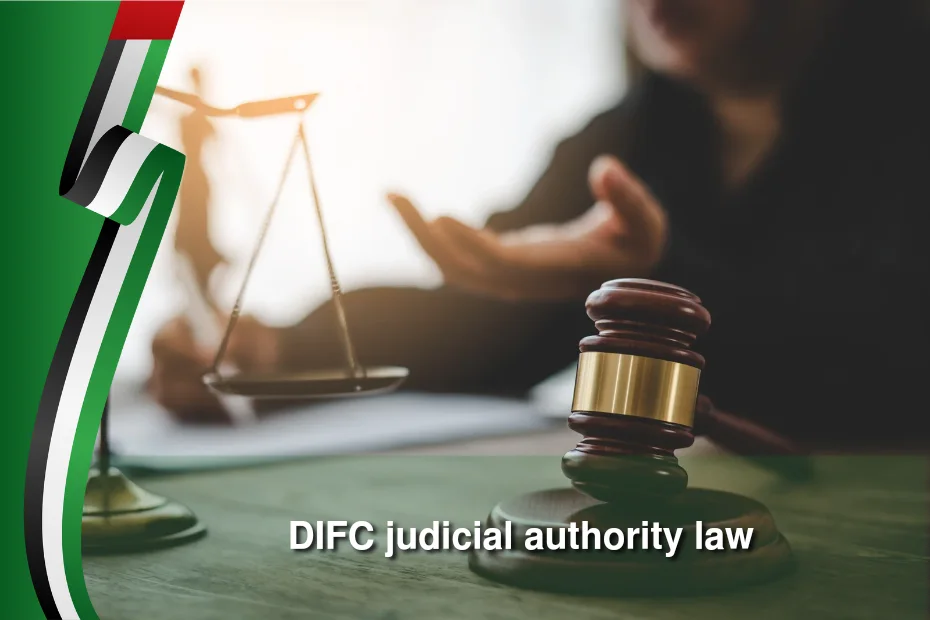Law No. 12 of 2004, also known as the DIFC Judicial Authority Law, is the foundational legal framework establishing the jurisdiction and authority of the DIFC Courts.
This law sets out the structure, powers, and functions of the DIFC Courts, providing a comprehensive legal framework for resolving civil and commercial disputes within the DIFC.
The latest updates to this law, encapsulated in Decree No. 29 of 2024, have introduced significant changes to enhance the efficiency and clarity of the judicial process.
This article explores these updates, the most important rules, and the legal services provided by Al Mulla Lawyers & Legal Consultants related to this law.
Contact Al Mulla Law Firm in UAE. Click the WhatsApp icon below or go to the Contact Us page. Locations: Dubai, Abu Dhabi and Ras Al Khaimah.
Table of Contents
Current DIFC Judicial Authority Law
The Judicial Authority Law provides a clear legal framework that outlines the jurisdiction and powers of the DIFC Courts.
This clarity is essential for businesses and individuals in the DIFC to understand their legal rights and obligations, ensuring that disputes are resolved efficiently and predictably.
The DIFC Courts are integral to Dubai’s legal landscape, providing common law jurisdiction in an otherwise civil-law region.
These courts have jurisdiction over civil and commercial disputes within the DIFC and are known for their efficiency and alignment with international best practices.
For more information, refer to Law No.12 of 2004 Judicial Authority Law PDF by DIFC Courts.
Recent amendments under Decree No. 29 of 2024 have further refined these courts’ operational scope and authority, addressing jurisdictional conflicts and enhancing judicial clarity.
Key Jurisdictional Rules DIFC
- Exclusive Jurisdiction: DIFC Courts hold exclusive jurisdiction over civil and commercial cases involving DIFC entities. For example, any contractual disputes executed within the DIFC fall under their purview.
- Enforcement of Foreign Judgments: The DIFC Courts can recognize and enforce foreign arbitral awards, which can then be executed by Dubai Courts. This is particularly advantageous for international businesses seeking efficient dispute resolution.
- Language of Proceedings: Proceedings in DIFC Courts are conducted in English, which is often preferred by international parties.
New DIFC Judicial Authority Formation
- Judicial Authority for Resolving Jurisdictional Conflicts: Decree No. 29 of 2024 established a new Judicial Authority to resolve conflicts between DIFC Courts and other judicial bodies in Dubai. This Authority is chaired by the President of the Court of Cassation and includes high-ranking officials from both DIFC and Dubai Courts.
- Scope and Responsibilities: The Judicial Authority is mandated to determine which court has jurisdiction over specific disputes and to specify enforceable judgments in cases of conflicting decisions. This is crucial for businesses and individuals to navigate the legal landscape more confidently, reducing the risk of protracted legal battles.
- Finality of Decisions: Decisions made by this Authority are final and not subject to appeal, ensuring swift resolution of jurisdictional issues.
- Implementation and Oversight: The Chairman of the Dubai Judicial Council oversees the implementation of this decree, ensuring compliance across all judicial bodies.
Legal Services for Judicial Authority Law DIFC
- Dispute Resolution: Al Mulla Lawyers offer expert legal services in resolving commercial disputes within the DIFC jurisdiction. Their team is well-versed in handling cases under the new judicial framework.
- Arbitration and Enforcement: They assist in the arbitration process and the subsequent enforcement of arbitral awards through DIFC and Dubai Courts.
- Contractual Advice: Providing legal advice on contracts involving DIFC entities, ensuring they comply with the latest legal updates and amendments.
FAQs about DIFC Judicial Authority
Conclusion:
The recent amendments to the DIFC Judicial Authority Law, particularly under Decree No. 29 of 2024, signify a major advancement in Dubai’s legal system.
These changes enhance the clarity and efficiency of resolving jurisdictional conflicts between DIFC Courts and other judicial bodies. Understanding these updates is crucial for businesses and legal practitioners to navigate the legal landscape in Dubai.
Al Mulla Lawyers are well-equipped to provide expert legal services in this dynamic environment, ensuring compliance and effective dispute resolution.
Contact Al Mulla Lawyers today! Click the Whatsapp icon below or visit our Contact Us page.
Find us at these locations:
– Dubai: Deira, Port Saeed, Street 8, City Avenue Building, Office 705-708.
– Abu Dhabi: Corniche Street, Golden Tower, Office 22.
– Ras Al Khaimah: Al Nakheel, Al Maamoura Building (Emirates NBD Bank Building), Fourth Floor.
Read about DIFC court lawyers in Dubai Best Services.
Omar Al Mansoori is an Emirati legal advisor and researcher with over 10 years of experience in civil, commercial, and corporate law in the UAE. He focuses on simplifying complex legal topics and ensuring that every article published aligns with the latest national legislation and official regulations.
